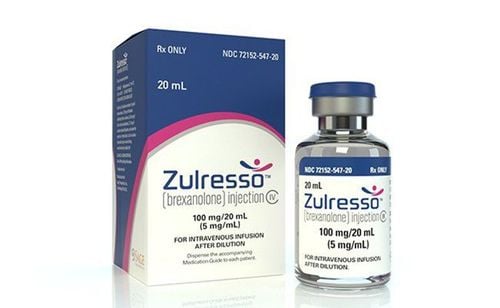This is an automatically translated article.
The article was advised by Specialist Doctor II Huynh Thi Hien - Obstetrician and Gynecologist - Department of Obstetrics and Gynecology - Vinmec Nha Trang International HospitalPostpartum depression seriously affects the health of the mother, especially the physical and mental development in the child. In the case of severe disease, the woman will not be able to control her thoughts and actions, causing acts of violence against the child right after giving birth.
1. What is postpartum depression?
In some women, 2-3 days after giving birth, there will be feelings of depression, anxiety, disappointment, or anger with those around them. Some other expressions such as:
Crying for unknown reasons. Difficulty sleeping, difficulty eating, difficulty making decisions. Do not trust the ability to protect, protect and care for children. These feelings are often called the “postpartum blues” – feelings of sadness after giving birth, which can quickly go away on their own a few days after giving birth.

2. How long does postpartum depression usually last?
Postpartum depression usually improves on its own within a few days to 1-2 weeks postpartum without treatment.
3. What is postpartum depression?
Postpartum depression is a condition associated with very strong emotions such as sadness, anxiety, and hopelessness that interfere with daily activities.4. When does postpartum depression occur?
Postpartum depression is most common one to three weeks after the baby is born, but it can also be present from birth to up to a year postpartum.5. What causes postpartum depression?
Postpartum depression can occur due to a combination of more than one of the following causes:
Changes in hormone levels in the body: During the first hours after giving birth, estrogen and progesterone levels in the body drop sharply, which can lead to depression. This is similar to stress and mood swings as hormone levels change slightly before each menstrual cycle. History of depression: Women who suffered from depression before, during, or after pregnancy, or who are being treated for depression, have a higher risk of developing postpartum depression than the general population. Emotional factors: Unplanned or unintended pregnancy can affect a mother's emotions during pregnancy. Some pregnant women still have a long time to adjust to having a baby. The mother may experience emotions such as sadness, anger, blaming herself when the baby has health problems or having to spend a long time in the hospital. Emotions that affect self-confidence and put pressure on the mother can be one of the causes of depression. Fatigue: Many women feel extremely tired after giving birth, it takes them weeks to regain strength and energy. In women who give birth by cesarean section, the recovery time can be even longer. Life factors: Lack of help from relatives. Experiencing a stressful event, such as the death of a loved one, illness in a family member, or a change of residence, are also factors that increase the risk of postpartum depression.
6. If postpartum depression is suspected, when should you consult a doctor?
If your family or yourself are worried about postpartum depression, don't wait until your postpartum appointment, see your doctor as soon as possible.7. Postpartum depression treatment?
Antidepressants can be used to treat postpartum depression, often in combination with counseling therapy.

8. What are antidepressants?
Antidepressants, which include several types, sometimes used in combination to maximize effectiveness, are medications that balance the chemicals responsible for mood regulation in the brain. Depression usually improves after about three to four weeks of medication.9. Do antidepressants have side effects?
There may be. However, most side effects from antidepressants are temporary and go away after a while. In severe or unusual cases, the doctor should be informed immediately to change to another antidepressant. If shortly after starting the medication, depression gets worse, or you have thoughts of hurting yourself or others, contact your treating doctor or emergency team immediately.10. If breastfeeding, will antidepressants be absorbed into the baby?
In general, antidepressants can be absorbed into the baby, in low concentrations, if the mother is breastfeeding. Breastfeeding brings a lot of benefits to both mother and baby, so it is important to carefully consider the benefits - harms when choosing to use medicine. The best advice is to consult with your treating physician.11. How does counseling therapy work?
During a counseling session (also called psychotherapy), the person will talk and discuss with the therapist about their emotions and how to manage them. A course of therapy can last several weeks, months or more.12. Classification of counseling therapy?
You can choose from individual therapy (one-on-one chats with a therapist) or group therapy (talk with therapists and other people experiencing similar problems). Family therapy (talking with a therapist and one or more family members), couple therapy (talking with a therapist and husband), are a few other options.13. What can be done to prevent postpartum depression in women with a history of depression?
The treating doctor needs to know information about the history of depression and antidepressant medication of the mother right from the time of pregnancy, ideally before the time of pregnancy. Pregnant women may be advised to start treatment soon after giving birth to prevent postpartum depression. Pregnant women who use antidepressants before becoming pregnant need to be consulted, evaluated and decided by their doctor to continue using the drug during pregnancy or not.
14. Support to cope with postpartum depression?
Support organizations for coping with postpartum depression can be found at hospitals, family planning clinics, and community centers. Ask the hospital where the mother gave birth to help find information about support organizations.
Please dial HOTLINE for more information or register for an appointment HERE. Download MyVinmec app to make appointments faster and to manage your bookings easily.
References: Acog.org, Medline Plus, Postpartum Support International, National Women's Health Information Center













